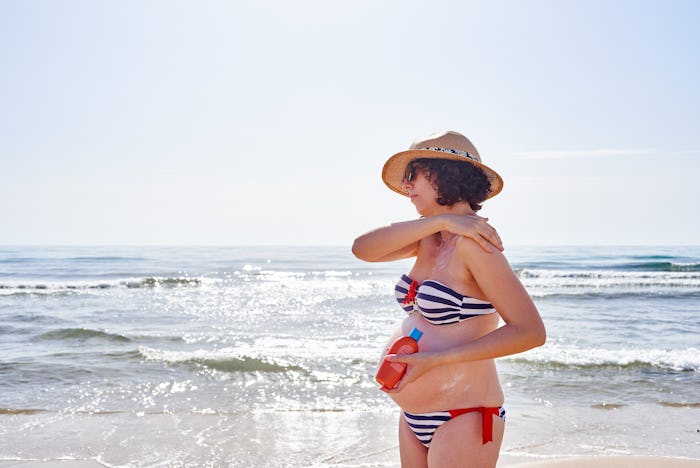Hot Mom Summer

Everything You Need To Know About Using Self-Tanning Products During Pregnancy
Glow on with your bad self.
Once you’re pregnant, you start having to question whether everything is safe: your favorite matcha latte, the charcuterie you usually order at that one restaurant, and even your skincare. So, if you’re someone who likes to self-tan when summer rolls around, you’ll no doubt be wondering if pregnancy-safe self-tanners are a thing you have to worry about. Fear not, you can still get your tan on, according to experts, as long as you’re shopping cautiously. You’ll just need to shop with a few tips in mind to find the perfect, pregnancy-safe product.
Can you use self-tanner while pregnant?
Short answer, and probably the one you were hoping for: yes. Using a self-tanner is safe throughout pregnancy regardless of what trimester you’re in, says Dr. Sharlay K. Butler, M.D., M.P.H., OB-GYN at Brigham & Women’s Hospital.
But if you prefer to be extra safe, you could wait until you’re out of the first trimester before applying your faux glow. “I would try to keep the ones that have chemicals at a minimum, and not [use them] during the first trimester, because that’s when everything’s most sensitive,” says Dr. Jacqueline Moline, M.D., and internal medicine specialist and vice president of occupational medicine and epidemiology at Northwell Health (i.e. she knows a lot about chemicals).
Dihydroxyacetone (DHA) during pregnancy
The active ingredient in any self-tanner is dihydroxyacetone, street name DHA (not the same DHA that’s in your prenatal vitamins). It reacts to amino acids on your skin’s outermost layer and creates a browning effect. There isn’t a ton of scientific data out there about its safety in pregnancy, but there’s enough that docs aren’t too worried about you using it.
“There hasn't been a lot studied on it, but apparently it is not well-absorbed or is not absorbed. So it’s not going to get into the body,” says Moline. “The way self-tanners work is it stains the dead skin and then in seven to 10 days, the cells slough off and that’s why you have to reapply.”
Just remember, having a fake tan doesn’t protect your skin from the sun at all. You’ll still need to apply plenty of SPF to prevent a sunburn.
Can I get a spray tan while pregnant?
When choosing what type of sunless-tanning application is best to use while pregnant, lotions and creams are safer than spray tans, which doctors do not recommend getting during pregnancy. While doctors say they have a pretty good understanding of how much DHA absorbs into your body when applied to the skin, that number would go way up if the product gets into your eyes, mouth, and nose, or you breathe it in.
“From what we know about DHA, and data is very limited on this, when it’s topically applied to your skin — not any sort of moist mucus membrane areas like your eyes, mouth, ears, nose — only about 0.001% is absorbed into the bloodstream. And we don’t know if that crosses the placenta,” says Butler. “When you think about spray tans and it being aerosolized, it makes sense that if you’re having exposures to places of additional absorption like your eyes, nose, and mouth, theoretically you could probably get higher absorption of DHA. Again, we don’t know if it crosses the placenta, but certainly higher concentrations of any kind chemical should probably be avoided in all trimesters.”
Moline seconds Butler: avoiding spray tans is good health advice in general, and is especially important when you’re pregnant. Lotion and cream self-tanners are the same product, just using a different application method, she says.
Pregnancy-safe self-tanners
If you’re shopping for a new self-tanner or want to double check that your usual favorite is safe, Butler and Moline have a few suggestions for finding the best product:
- Choose lotion, gel, or mousse formulas. Using a spray self-tanner could lead to you inhaling some of the product.
- Opt for a self-tanner with as few chemicals as possible. When you read the ingredient list on the bottle, that just means looking for the shortest one you can find.
- Avoid products with any extra skincare ingredients that aren’t pregnancy-safe, like retinols or vitamin A.
The American College of Obstetricians & Gynecologists (ACOG) also encourages pregnant people to choose products that are fragrance-free and formulated without pthalates, parabens, oxybenzone, and triclosan. This is a lot to remember when you’re scrolling on Sephora or Ulta, or standing in the aisle at Target. So, just know that these products meet all of the experts’ criteria:
Both experts agree that even if self-tanner usually doesn’t irritate your skin, you should do a patch test 24 hours before you use the product all over — being pregnant can cause sensitive skin for some people.
If you decide to self-tan this summer, now you know exactly which products are OB-GYN approved for you and your baby. And if you’re just not up for sweating it out on the beach while pregnant, more power to you.
Experts:
Dr. Sharlay K. Butler, M.D., M.P.H., OB-GYN at Brigham & Women’s Hospital
Dr. Jacqueline Moline, M.D., and internal medicine specialist and vice president of occupational medicine and epidemiology at Northwell Health
This article was originally published on